
We decided to put it to a vote.
I already knew how my husband, Ned, would vote. He was the risk-taker of the family, which was how we had ended up in China in the first place. I considered myself the more grounded half of our pair, so I took it upon myself to think this through for both of our sakes.
On the one hand, our local guides had just informed us that the overnight rains and sub-zero temperatures had created slick, icy road conditions, making an already treacherous mountain pass downright dangerous. On the other hand, we had already taken two flights earlier that day from Shenzhen, the manufacturing base where we were living, to Xichang, a small city in the Liangshan Prefecture of Sichuan Province, and had driven a couple hours to reach the Meigu county seat. Now, on the last leg of the journey and less than thirty kilometers from our destination, it would be a shame to turn back.
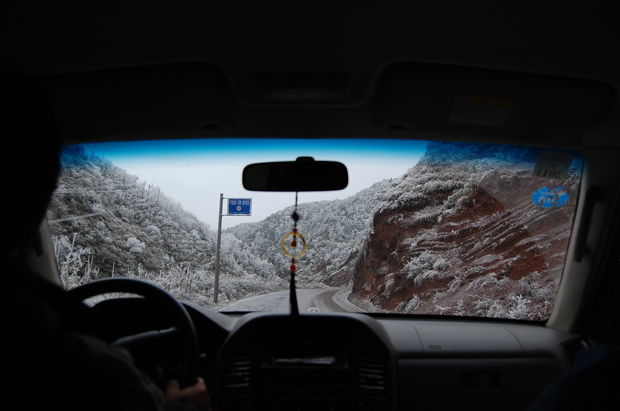
The whole point of the trip was to visit our customers, a village of Yi people, an ethnic minority in China. The village was high up in the mountains, far away from any of the economic growth that was sweeping the rest of the country — and far off the energy grid. The families in this village were exactly the kinds of people for which our start-up’s solar-powered lanterns had been designed. They were why Ned and I had moved to Shenzhen to establish the manufacturing operations of the company, called d.light design.
“If you want to go, raise your hand,” said Robin, the representative from the foundation that was funding the project. He and Ned both raised their hands immediately.
I glanced at Jun, the other woman in our party. She was with the local NGO managing the distribution of the lights. Out of all of us, she knew the terrain the best, and she looked terrified. I gave her a sympathetic glance but still raised my hand. If today was the day I would die, then dying while trying to bring light to impoverished families with no electricity seemed like a decent way to go.
There are over one billion people in the world today who still live without grid electricity, and several hundred million more who live with only intermittent electricity. Many live under governments that are too corrupt or too poor to provide this infrastructure. Others live in terrain that makes it difficult to build power lines.
For this Yi village, despite its remote location, the reasons for its lack of electricity are not so simple. About 98 percent of China’s massive population, including many who live in far-flung areas, has access to reliable, affordable electricity. No one can say that the Chinese central government doesn’t have enough resources to provide electricity for the remaining 2 percent. But they choose not to. The Chinese authorities, in line with centuries-old policies of discrimination against ethnic minorities, have decided that this village and others like it are not worth the investment.
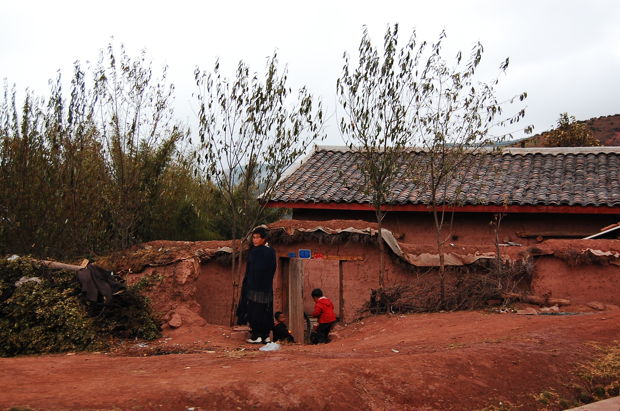
Without electricity, the days are much shorter. Adults have fewer hours to work; children have fewer hours to study. Without electricity, families are cut off from information and culture. They can’t use mobile phones, radios, or televisions. Without electricity, alternative sources of light and energy must be found, such as diesel generators, kerosene lanterns, and fire. These are all dangerous solutions that harm people through toxic fumes and burns, and harm the environment by emitting high volumes of carbon dioxide.
The United Nations recently started referring to off-grid households as “energy poor.” The lack of reliable energy so limits opportunities for families that it perpetuates poverty and prevents them from fully participating in society. Being off-grid keeps the Yi people in the mountains, but it also keeps them in another era, long before China opened up its economy and rose to become one of the world’s superpowers.
As we inched our way up the narrow mountain road, I admittedly had a hard time remembering all this. I was instead calculating that we had at least a 10 percent chance of careening off the mountain and perishing in a place whose name I couldn’t remember. It didn’t help that our driver inexplicably refused to use the snow chains stored in the back of the van. They clanked together teasingly whenever we hit a bump in the road or swerved into a hairpin turn. Ned sat in the front passenger seat, too far away for me to clutch his arm in terror. Jun sat beside me in the backseat, knuckles taut and cursing in Mandarin under her breath.
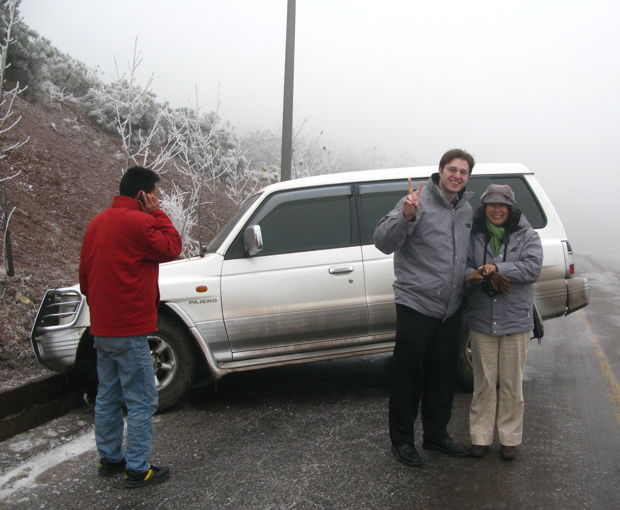
We skidded on the road twice. The first time the mountain approached us far too quickly, stopping just a few feet shy of Ned’s nose when the front wheels of our van lurched into a ditch that had appeared out of nowhere. The second time the mountain fled away from us far too quickly. The car sped toward nothingness, the occasional guardrails I had seen along the way conveniently absent. The seconds stretched into what felt like minutes, the car silent except for the put-put of the driver’s frantic — and fruitless — stomping on the brake. In that moment, I knew I was a dead woman and prayed that God would receive my soul. He rejected my proffered soul, instead stopping the car in the middle of the road, several yards away from the cliff edge.
Four very long hours later, we pulled into the village. My legs trembled as I stepped down onto the ground, my eyes squinting against the fading light in search of hidden patches of ice that might maim me after I had just escaped death. I tried not to think about how it would be nighttime when we returned down that same road.
A biting wind blew across my face and I shivered, pulling my heavy windbreaker more tightly around me and tugging my knit cap over my ears. My eyes watered from the cold; my toes were already stiff and numb. Suddenly, the ice-covered mountain road seemed welcoming. Anything to escape this unbearable cold.
Then I looked up — finally, truly looked up. Several dozen people, their hair and eyes dark as obsidian against the snowy terrain, were staring at us, silent and unsmiling. They crouched around three large fires, spires of smoke rising up to make contact with the heavy gray clouds overhead. Most of the men wore knit, ivory-colored cloaks wrapped tightly around them. The cloaks looked heavy but surprisingly porous, the bitter wind still surely wending its way through the fabric. The women wore layers of stunningly bright colors — jewel tones of fuchsia, emerald green, and sapphire. Smaller shapes, hidden behind caps and cloaks and sweaters, huddled closest to the fire. Children.
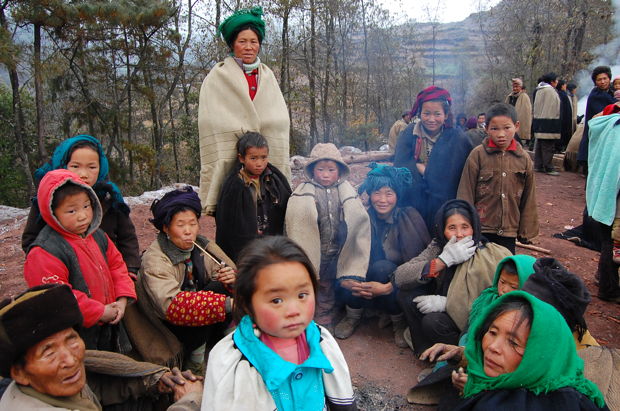
Their faces captivated me the most. Each child, down to the smallest infant, had a bright stain of red across each cheek, like face paint from a fair or party. They were, I realized with dismay, brands of a young life lived under harsh conditions: cold burn from too much exposure.
As another gust of freezing wind roared past my ears, I squashed any more complaints I had about the cold and the dangerous drive. I had not earned the right to complain about my existence. This place, which seemed so uninhabitable to me, was home for these families.
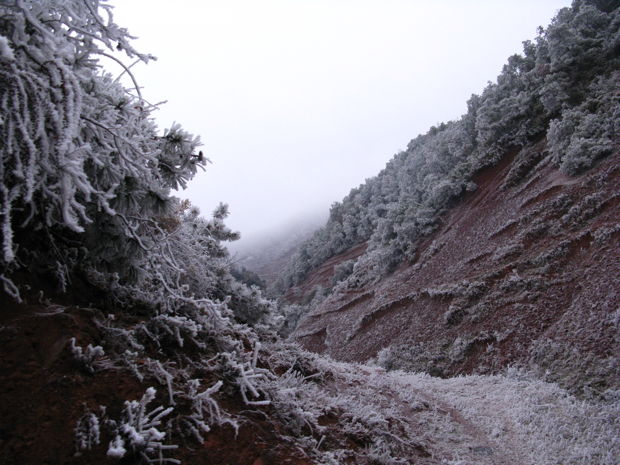
On our ride together from Xichang airport to the Meigu county seat, Robin had explained to us the situation of the Yi people in this region. Their villages offered little work. Their lack of education and Mandarin skills made it almost impossible for them to find decent jobs in nearby towns. But the men left anyways, walking down that same treacherous road we would skid on later that day, looking for work wherever they could, often resorting to drug-running along the porous border between mainland China and Myanmar. The penalty for drug trafficking in China is execution, enough of a deterrent for most Chinese to stay far away from the business. But not those who feel like they have no other option.
Robin also told us how the Yi people are renowned for their music and their dancing. Their singing voices in particular, he said, are well known and admired throughout China. The following day we would attend a Yi wedding, where Ned and I would listen in awe to their strong, brash voices, voices that pierced the air and the soul. But on this late afternoon, as I looked into their weathered faces and weary eyes, all I heard was the crackle of fire and the crunch of snow and gravel underfoot.
Once we were all situated, we held a formal ceremony, the Chinese equivalent of a press conference — full of large banners with poetic slogans, rotund government officials, and plenty of photos ops — to announce the beginning of the project. In collaboration with the foundation and the local NGO, we would be providing subsidized solar-powered lights to each of the hundred or so families in the village. All revenue from the lights would be reinvested into the community for educational services.
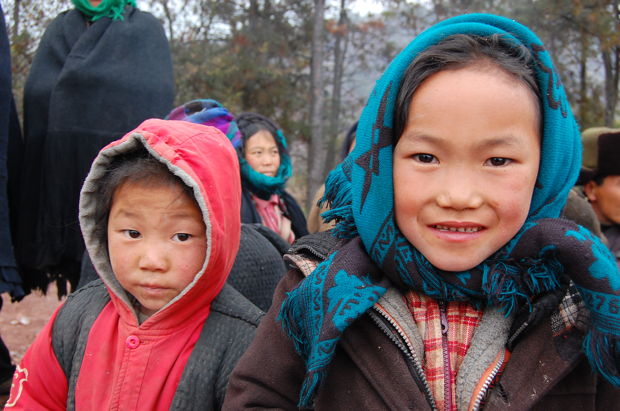
I snapped photos as Ned got up to speak. The villagers applauded politely as his words were translated into Mandarin by Robin, and then applauded again as the Mandarin was reworked into the local dialect by a second interpreter. We had no way of knowing if what the villagers heard in the end at all resembled what Ned had said. But one thing we were pretty sure they understood: life as they knew it was about to change, and hopefully for the better.
I barely remember the ceremony, but I do remember the pig they slaughtered for us. It was night by the time we gathered in the village head’s home to feast on the pig, which had been butchered into cubes about the size of my fist. I could barely see what I was eating as I sat near a fire, smoke filling my nostrils inside the home, the darkness around me thicker and more impenetrable than any darkness I had experienced before. Outside, away from the fire, I couldn’t see my hand even when it was touching my eyelashes.
This was home for these families, I remembered again.
My home, back in California in the United States, suffered from an embarrassment of riches. On top of our material abundance, we were blessed with perfect weather, family, friends, and countless opportunities. I had left all of that with the expectation that I would find some acceptable substitutes during our stay in Shenzhen. None of that had come to fruition as Ned and I struggled to set up an office and build a team in China.
Over a year after moving, we were terribly lonely, overworked, exhausted, and anxious in what is still an oppressive country. I felt like I was barely surviving. Even as we continued to plug away, day in and day out — raising funds, overseeing manufacturing, hiring staff, making sales pitches, designing websites and marketing materials — I asked God why life had to be so hard for us.
Then we visited the Yi village, and I saw what it actually meant to fight for survival.
The lights we were providing were fairly simple: portable LED lanterns with rechargeable batteries that were powered by a solar panel. Each light was bright enough to illuminate one room, which was sometimes an entire home. It seemed a small gesture, to provide these lights to families here in rural China, given the great challenges they faced on a daily basis. Just as it seemed a small gesture to provide the same lights to families in war-torn East Timor, or to struggling farmers in India, or to young students in Tanzania.
But the power of light, I learned, should never be underestimated.
We were assigned a different driver on the way back to the Meigu county seat, one who held the steering wheel lightly and navigated across the icy pavement as if he was simply driving home after a long day’s work. We didn’t skid a single time, though I admit I asked God to accept my soul at least a couple more times on the way down. He said no yet again. Our work, it seemed, was not yet done.
A few months later we received reports from the local NGO about how the Yi families were faring. They uniformly reported increased productivity, increased health and safety, even increased socializing. Thanks to the newly available bright light, Jun and her colleagues had been able to start evening Mandarin and life skills classes in the village, classes that could open doors into the mainstream Chinese economy. Their lives had changed.
“Finally, our small mountain village has light at night! Now we are able to reap our corn, feed our cows, read, and study at night,” one villager shared with us. “Our villages will never again experience the pitch-black night. Instead, in the newly opened night school, there is laughter and singing for all the mountains to hear.”
Over 21,000 Yi families in rural Sichuan Province now have access to bright, reliable, and safe light through this partnership. D.light has, by the grace of God, become one of the leading providers of solar-powered solutions for the world’s poorest families, reaching over 28 million people in more than 40 countries. The light — and its positive impact on the income, education, and health of families all around the globe — continues to spread.
But that day, as we stepped once again onto solid ground in the Meigu county seat, we didn’t know any of that. We just knew that we were tired and worn and cold, and that the next evening we would be returning to our high-stress lives in Shenzhen, trying to find home in a foreign country while building a company that few thought could succeed.
I asked God yet again why everything had to be so hard. He didn’t give me a direct answer, but he gently reminded me that this Yi village, full of marginalized ethnic minorities in a harsh and forgotten corner of the world, was well worth the investment.